The importance of automation in streamlining marketing activities cannot be emphasized enough. From nurturing leads to targeting the right audiences, automating repetitive tasks, and driving operational efficiency, marketing automation platforms transform the customer experience landscape.
Marketers are benefiting from instant communication. They can extract actionable insights and improve campaign management. They can also measure the ROI of their marketing initiatives while boosting customer engagement.
Here’s what the data tells us about the ever-growing demand for marketing automation platforms:
- According to estimates, the global marketing automation market will rise at a CAGR of 12.3% during 2022-2032, reaching US$ 15.7 Billion by 2032.
- Recent research throws light on the multi-dimensional company-wide benefits of using marketing automation, such as:
– Reduced staffing expenditure
– Improved productivity and efficiency, with data suggesting that a single worker can effectively compete with a sales and marketing department comprising 50 or more personnel!
– Enhanced efficiency with reduced chances of an error
– Increased revenues and profits as customer flow-ups, up-sells, and cross-sells become automated, thereby increasing the consumer lifetime value
The learning: Organizations looking to improve productivity, customer experience, and their bottom line need to get their hands on a customized marketing automation platform that works for their unique needs (and not the other way around).
How are automation platforms making marketing efficient?
The real question is, “What pain points and challenges can marketing automation platforms iron out and help organizations overcome?”
Marketers today struggle with wide-ranging issues that marketing automation can effectively solve, such as:
Challenge #1: The inability to do ‘more’ with less
Marketing automation empowers marketers to multitask and achieve more in a shorter period of time. This includes closing more deals, driving revenues, and improving customer satisfaction rates. One tried-and-tested way of improving the customer experience is to collect real-time feedback from existing customers.
A marketing automation platform will free up the marketer’s time by automatically sending the email to customers after a predefined time period. The platform will collect invaluable insights from customers. This data can further be used to address key customer concerns relating to customer service, the product, and so on.
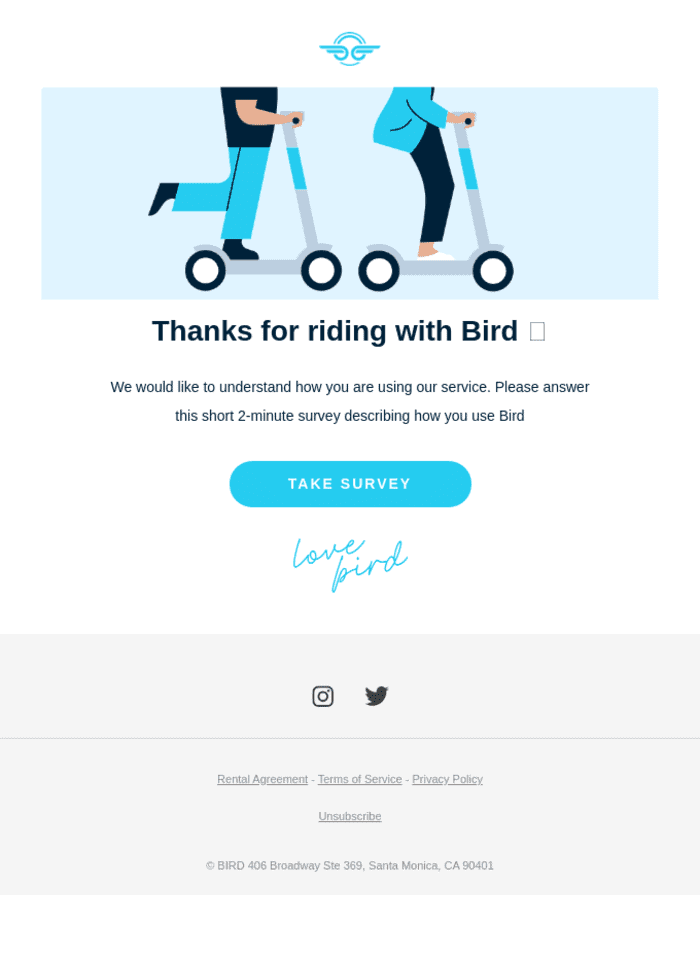 Marketers can use this ‘saved’ time to focus on more strategic tasks that involve a ‘human touch.’
Marketers can use this ‘saved’ time to focus on more strategic tasks that involve a ‘human touch.’
Challenge #2: The inability to optimize and track user engagement levels and streamline the marketing workflow
Overburdened marketers should take the time to review critical customer inputs and feedback. This is where a marketing automation platform can:
- Relieve marketers of daily tasks (think: sending personalized emails, analyzing key metrics such as user engagement levels, etc.)
- Drive consistency between marketing campaigns, leading to greater marketing strategy optimization. As an example, consider the collaboration between Nike Air Jordan and the Facebook Messenger bot:

By integrating your marketing automation platform into your CRM and existing tools, such as live chat (in this case), you can extract valuable insights into what your customers like and create in-depth buyer personas.
- Conduct an omnichannel campaign that empowers brands to connect with the right customer at the right time and with customized content and smart and relevant segmentation. For instance, here’s an example of an ‘abandoned cart’ email that gets triggered if a customer has left something in the cart:

Challenge #3: The inability to convert leads and prevent chances of a leaky sales funnel
According to McKinsey, “Early adopters of sales automation report higher customer satisfaction, efficiency improvements of 10-15%, and sales uplift potential of up to 10%.”
With marketers donning multiple hats, capturing, tracking, managing, and scoring leads becomes challenging. According to 60% of B2B marketers, it is a time-taking, effort-intensive, and costly affair. An automated marketing platform can help:
- Automate key processes as well as conversations both online and offline
- Optimize your marketing and CX programs while demonstrating the ROI of your efforts
- Convert leads more cost-effectively and nurture them across channels (such as email, social, mobile, etc.). As per a study by Forrester Research, “A well-designed lead nurturing program can raise lead conversion rates by up to 50% while reducing lead acquisition costs by up to 70%.”
- Marketers understand whether a lead would be a good fit for the company or not, create an in-depth buyer persona, and personalize each buyer’s journey with respect to communication and customer experience. Here’s an example of a comprehensive buyer persona that is created using real-time customer data such as likes, interests, etc.:

Top 5 Marketing Automation Platforms Worth Considering
1. MoEngage.com:
If you are looking for an AI-powered insights-led marketing automation platform to amplify your growth by 4x, MoEngage is well worth the investment. This platform allows marketers to build omnichannel marketing automation workflows within minutes and target customers contextually.
Marketers can target customers based on real-time user behavior and create ‘intelligent’ and hyper-personalized customer journeys. For instance, smart triggers allow marketers to send automated messages to customers based on their past activity. Finally, the no-code workflows empower marketers to reach customers at critical points in their lifecycle:
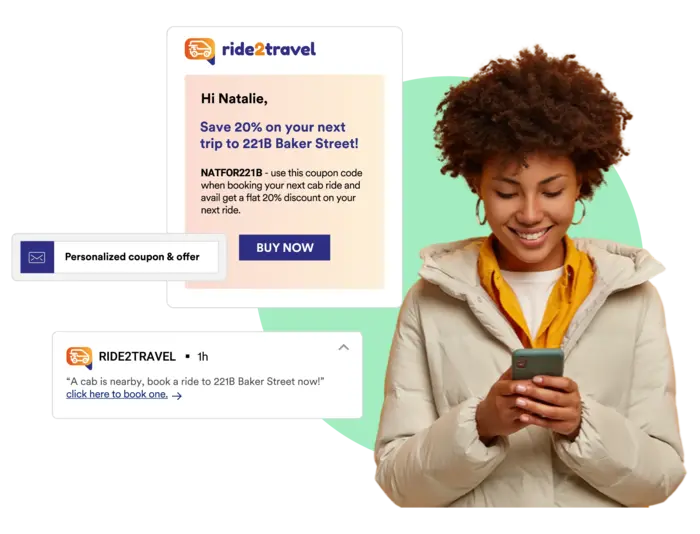
2. HubSpot:
HubSpot’s marketing automation software is powered by your CRM data. The platform offers in-built workflows and journey builders to roll out automated campaigns at the click of a button.
You can use the platform to automate repetitive tasks such as sending out forms to leads, driving a personalized email campaign, and more:
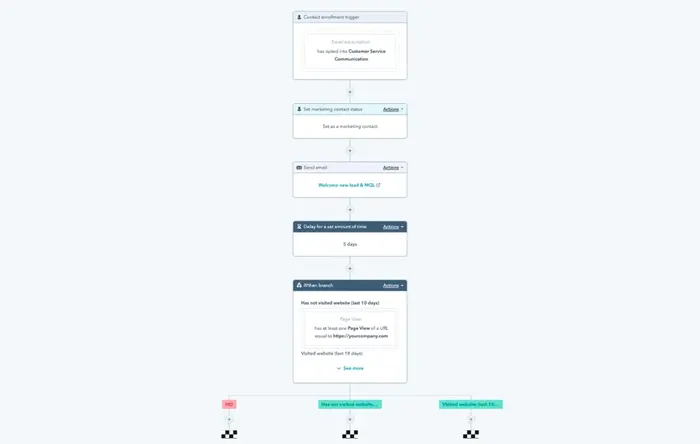
3. ActiveCampaign:
As the name suggests, ActiveCampaign allows you to automate your emails and interactions, irrespective of task complexity. With a centralized dashboard, you can unify all your customer data and connect with customers immediately.
Moreover, you can segment customers, use forms that get triggered once the lead submits their information, and assess KPIs such as email deliverability rates with this all-powerful tool.

4. Marketo:
When it comes to elevating your marketing game, Marketo has your bases covered. Think of it as your trusted marketing assistant who can streamline your marketing tasks and tackle repetitive work so that you can focus on strategic thinking and creative problem-solving.
One of Marketo’s standout features is its ability to personalize customer communication. You can easily engage your audience personally and make each customer feel unique and valued. Marketo’s AI functionality will build predictive audiences and segments so that you can have direct, one-on-one conversations with customers.
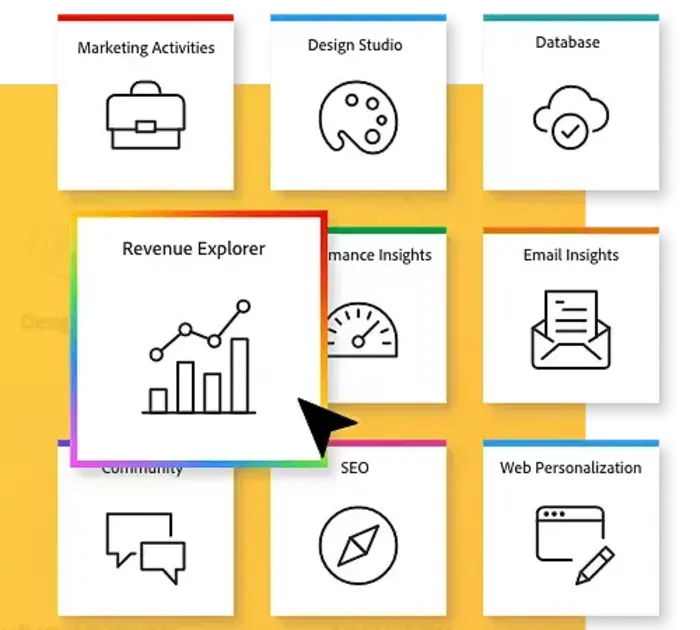
5. Pardot
Salesforce Pardot helps you to generate more leads and move them through the funnel quickly. This B2B marketing automation platform is easy to use, feature-rich, and flexible.
That’s not all. You can deliver personalized moments, automate cross-channel journeys, and optimize marketing performance with this 360-degree tool. If you want to drive greater sales and marketing alignment with a single source of truth, Pardot is the platform for you!
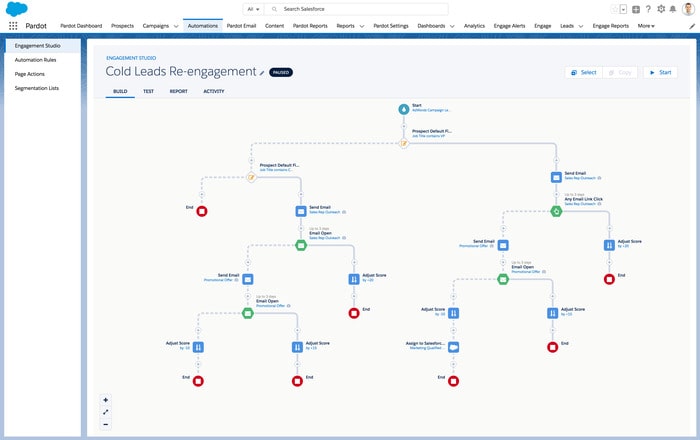
The Six Critical Elements of Marketing Automation Platforms
A marketing automation platform typically comes power-packed with a host of valuable features. This allows marketers to meet their consumers halfway through, deliver the desired results, and measure the ROI. Let’s understand the must-have features of a marketing automation plan:
- Database: Think of this as a centralized place for all your marketing data–from detailed prospect and customer interactions to information on user behavior. With this streamlined and organized data, marketers can segment and target the right customer at the click of a button.
- Analytics: The Analytics feature enables marketers to test, analyze, and optimize their ROI. It also helps them understand exactly how their campaigns impact the bottom line. This analytics data empowers them to pivot as needed while understanding what’s working and what isn’t. For example, Starbucks engages in effective and active ‘social media listening’ to respond to customer suggestions, queries, and feedback in real-time and drive a stellar customer experience:
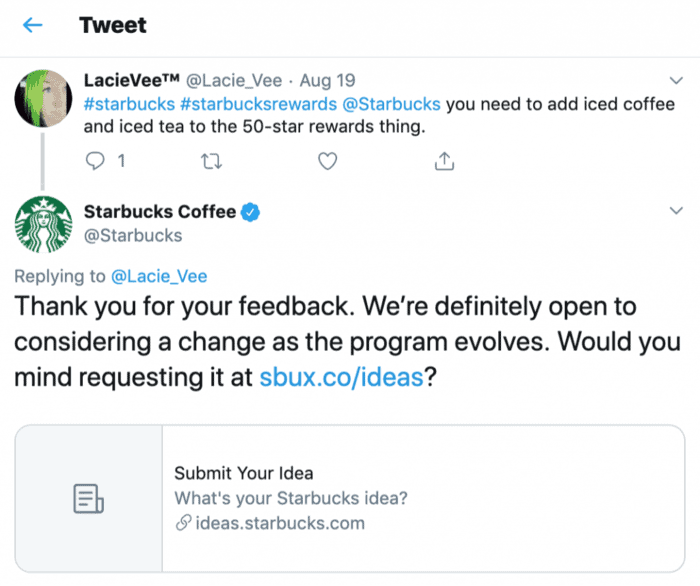
- Engagement marketing engine: This refers to an environment for creating, monitoring, and automating key engagement marketing processes for both online and offline channels. In simpler words, think of the engine as the orchestrator of all your vital customer interactions.
- MarTech: MarTech essentially refers to a seamless collection of collaborative and scalable marketing applications. The end goal of using these applications is to achieve marketing goals and stay connected with prospects while ensuring on-point marketing-sales-customer support alignment.
- Communication: The platform must allow marketers to drive instant, agile, and effective real-time communication between platforms and channels. This includes emails, apps, websites, social media, etc.
- Optimization: Optimization is a core requirement of every marketing automation platform. Marketers must be able to optimize campaigns for customers with cross-channel journeys at scale. More importantly, marketers must also be able to tweak the data as required with as little effort as possible and improve their team’s performance.
Why is a marketing automation platform a necessity for customer engagement planning?
- Omnichannel integration and cross-channel execution: A marketing automation platform becomes essential for orchestrating cross-channel and integrated campaigns and communication. Whether you want to execute personalized campaigns or trigger events in real-time, an automation platform can help. It can easily be integrated with your CRM and other existing business process systems for a complete customer picture and for simultaneously automating multiple channels.
- Intelligence and analytics: An automated platform allows marketers to leverage customer data and understand the critical pain points of users. It provides a 360-degree view of the customer, including their likes, motivations, interests, behavior, and so on. This is made possible as the information is no longer sitting in silos. All the customer data is collated on one platform and presented to marketers as a single source of truth.
- Customer management cycle: Marketers can also build automation based on the customer’s life cycle stage and their associated behavior within the stage. They can segment customers into different segments and engage them accordingly. Using historical and real-time data, marketers get a clearer and more accurate understanding of where customers are in their buyer’s journey with the brand.
- Personalization: Marketers can drive hyper-personalized campaigns and reach out to customers in the moments that matter, thanks to real-time automated triggers. Marketers can respond to customers with the right content at the right time, improving the customer experience.
Wrapping Up…
Whether you want to execute agile and effective marketing campaigns on the go or engage customers with personalized messaging at scale, a marketing automation platform has emerged as a must-have for businesses. Driving campaigns based on a ‘gut’ feeling will no longer cut it. Organizations must use data as the new superpower to delight and engage customers.
By integrating valuable customer data into their CX strategy, marketers can segment customers better, optimize their campaign management efforts, and improve the bottom line–a win-win-win for all.